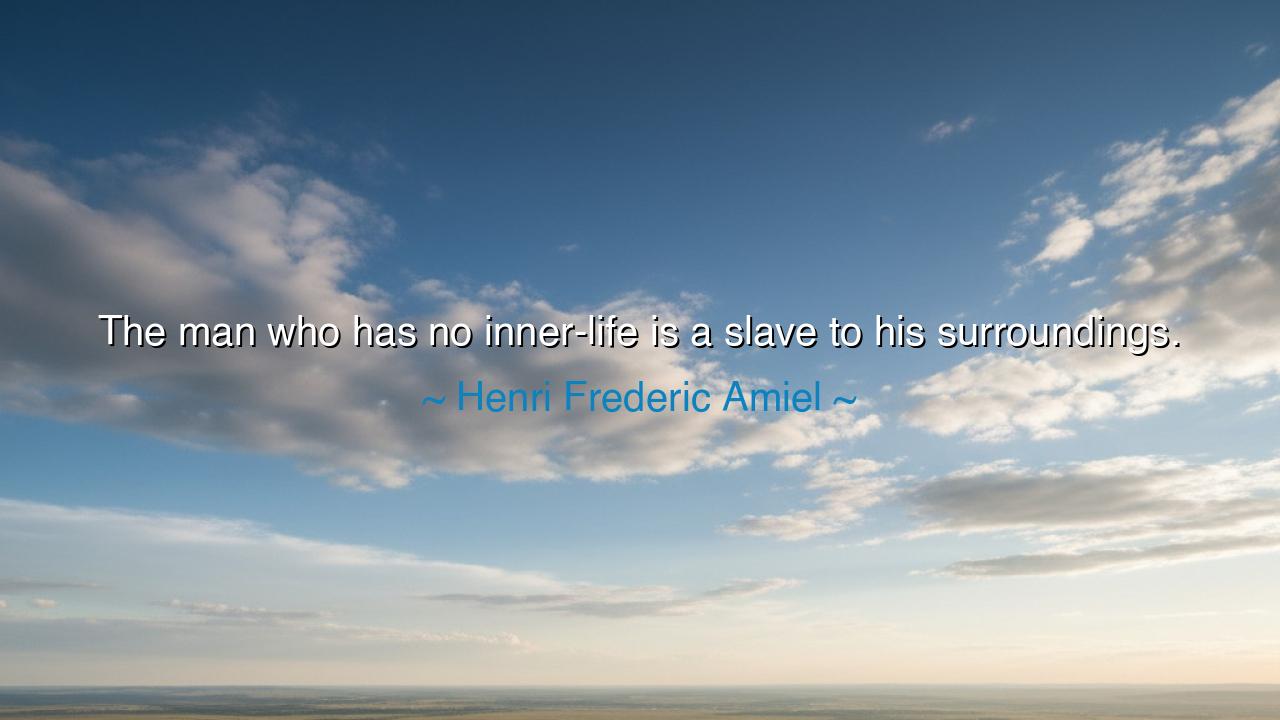
The man who has no inner-life is a slave to his surroundings.






When Henri Frédéric Amiel, the philosopher-poet of Geneva, wrote, “The man who has no inner-life is a slave to his surroundings,” he spoke with the quiet fire of one who had gazed long into the chambers of the soul. His words are not a condemnation, but a revelation — that freedom is not found in circumstance, but in the inner sanctuary of the mind. He who lacks that sanctuary, that deep and private world of reflection, becomes the captive of every wind that blows, every voice that shouts, every opinion that commands. For the outer world is a tempest, and only the man who possesses an inner-life has an anchor to keep him from being cast adrift.
Amiel lived in the nineteenth century, a time when Europe trembled between faith and reason, tradition and modernity. A professor and a thinker, he wrestled with questions of meaning in an age that had begun to lose its soul. He kept a journal — now famous — in which he wrote not for fame, but for clarity, searching always for truth within himself. To him, the greatest tragedy was not poverty or failure, but spiritual emptiness: the man who looks outward for all validation, who mirrors the moods of society, who never dares to be alone with his thoughts. Such a man, Amiel said, may appear free, yet he is the slave of circumstance — changing as the world changes, never guided by the compass of his own conscience.
Think of Socrates, that ancient guardian of truth. He walked barefoot through Athens, mocked by the proud and despised by the powerful, yet he was unshaken. His strength did not come from wealth, nor from status, but from the vast inner world he cultivated — a world of thought, virtue, and unyielding principle. When condemned to death, he did not tremble, for he was free within. No prison could bind him, no verdict silence him. Contrast him with the multitudes who live only by the noise of the crowd, who believe what is convenient and desire what is fashionable. Such men are slaves indeed — not of tyrants, but of their own emptiness.
In our time, this truth is more urgent than ever. We live surrounded by voices — the chatter of machines, the constant tide of opinions, the glitter of false desires. The one who has not cultivated his inner-life becomes a puppet to this storm. He is happy when the world flatters him, despairing when it scorns him. His peace depends on approval, his direction on the shifting winds of culture. But the man of reflection, of solitude, of self-knowledge — he walks through chaos with stillness in his eyes. For he carries within him a secret realm that cannot be invaded.
Amiel’s words, then, are not simply philosophy; they are a summons to self-mastery. To live rightly, one must retreat daily into the quiet chamber of the heart — to examine one’s motives, to weigh one’s thoughts, to remember what is eternal amid what is passing. In that silence, the soul gathers strength. Without it, even the strongest will crumble beneath the weight of the world’s demands. For what is man, if he does not know himself? A reed, swaying with every gust; a mirror, reflecting everything but revealing nothing.
Consider Viktor Frankl, a man who endured the unspeakable horrors of the Nazi camps. Surrounded by death, stripped of all possessions and dignity, he discovered that his last freedom — the freedom no man could take from him — was the power to choose his inner response. In that choice, he found meaning, and in meaning, he found strength to survive. Frankl lived Amiel’s truth: though his body was imprisoned, his inner-life made him free. Those who had no such world within, who depended wholly on the outer, were crushed by despair.
So let this be the lesson for all who live in the rush of modern life: cultivate your inner kingdom. Set aside moments each day for stillness, for reading, for reflection, for prayer or meditation — whatever opens the soul’s window to the infinite. Do not measure yourself by wealth, praise, or success, for these belong to the outer world. Measure yourself by the depth of your inner peace, by the strength of your thoughts, by the purity of your intentions. The outer world is fleeting; the inner one, eternal.
For as Amiel teaches, the man who does not possess that sacred inward life — who lives only in reaction to what happens around him — is not free, but bound. But the one who lives from within, who listens to the quiet voice of his spirit and follows it with courage, walks through the world unchained. The storm may roar, the crowds may sway, but his soul stands firm — like a mountain rooted in eternity, untouched by the passing winds of time.






AAdministratorAdministrator
Welcome, honored guests. Please leave a comment, we will respond soon